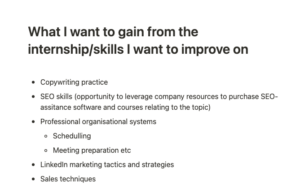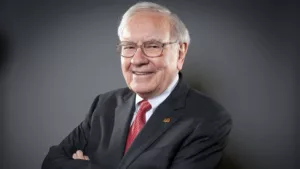Embarking on an internship is an exciting opportunity to gain experience and set a solid foundation for your career. While internships may initially seem like “free work,” it’s important to reframe your mindset and recognize them as “free experience.” In this blog post, we’ll explore strategies to help you get the most out of your internship and pave the way for future success.
TLDR
- Set goals
- Embrace a learning mindset
- Take ownership of your internship
- Reframe this as “free experience,” not “free work.”
- Make meaningful connections
Set goals
Goal setting is crucial for personal and professional development.
Establish two sets of goals: those you and your employer define and your personal goals. The goals you work on with your employer include launching a new project, taking ownership of a specific workflow, or improving a particular skill.
Your personal goals should be tailored to your interests and what you want to achieve from the experience. Whether gaining experience with SEO technology, creating a website or blog, or honing your design and organizational skills, having goals will provide direction and motivation.
Below is a re-life example of my goals in the first week of my internship. I didn’t get to cover all of them in the depth I wanted initially, but having this framing in the back of my mind allowed me to focus on the tasks that would enable me to learn them. It gave me a default decision–making framework. By taking ownership of your development, you ensure that your internship experience is personally fulfilling and aligned with your long–term career aspirations.

Embrace a Fearless Learning Mindset
You can’t let being afraid of looking stupid restrain your learning ability.
To truly make the most of your internship, overcoming the fear of looking foolish and embracing a fearless learning mindset is essential. Don’t allow the fear of appearing inexperienced or making mistakes hinder your learning ability. Remember that your internship is a learning opportunity, and having questions or gaps in your knowledge is entirely normal. Embrace the mindset that asking questions and seeking clarification is a sign of curiosity, growth, and a genuine desire to learn.
Recognize that internships are temporary in nature, typically lasting only a few months, and use this understanding as an empowering force to push your boundaries. Instead of feeling intimidated by the short duration of your internship, leverage it as a catalyst for personal and professional development. Knowing that your time at the organization is limited can allow you to take risks, explore new areas, and ask questions without fearing long-term repercussions. Use this perspective to your advantage and make the most of every learning opportunity that comes your way.
This approach to your internship will come with mistakes. That is natural. Mistakes are part of the learning process. When you make a mistake, own up to it with maturity and professionalism. Communicate the error to your supervisor or team, explaining what went wrong, how you plan to rectify it, and the preventive measures you’ll take in the future. Owning your mistakes demonstrates accountability and a willingness to learn from them. Embrace failure as an opportunity for growth and development.
Take ownership of your internship experience.
One of the critical factors in maximizing the value of your internship is taking ownership of your own learning and driving your experience. Recognize that as an intern, it is your responsibility to proactively seek opportunities, take the initiative, and demonstrate your ability to navigate tasks and challenges independently. By doing so, you not only showcase your capabilities to your employer but also create a meaningful and impactful internship experience for yourself.
- Be Your Own Driver: Understand that as an intern, you may not always have someone explicitly telling you what to do or assigning precise tasks. This is an opportunity for you to step up and demonstrate your initiative. Take the initiative to identify areas where you can contribute or problems you can help solve. Show your employer that you are proactive, resourceful, and capable of taking charge of your own learning and development.
- Seek Opportunities for Growth: Don’t wait for opportunities to come to you; actively seek them out. Identify areas within the organization where you can make a meaningful impact or gain valuable experience. Take the initiative to propose new projects, suggest improvements, or assist colleagues. By actively seeking opportunities for growth, you demonstrate your enthusiasm and commitment to making the most of your internship.
- Embrace Autonomy: Recognize that you won’t have constant guidance or hand-holding throughout your internship. Instead of waiting for instructions, take ownership of your own learning. Seek out resources, research industry trends, and stay updated on relevant topics. By embracing autonomy, you not only become a self-driven learner but also showcase your ability to adapt and thrive in a professional environment.
Free experience, not free work.

Warren Buffet graduated top of his class from Columbia Business School. When someone graduates top of their class from Columbia Business School, they can get a job almost anywhere they want. Warren Buffet approached his investing hero, Benjamin Graham, and asked if he could work for him for free. Benjamin Graham declined, as even without paying Warren a salary, the cost to the company would still be too great.
This story highlights two key lessons: interns cost the company (even if they aren’t getting paid), and if Warren Buffet (the most significant investor of all time and one of the wealthiest men ever to live) can see the value in working for free, so can you.
Internships are often seen as opportunities for free labor, but it’s essential to reframe our mindset and recognize them as valuable “free experiences.” You’re the one benefitting most from the relationship, not the employer.
Make meaningful connections
It’s essential to realize that the most valuable aspect of your internship is the people you’re exposed to. You’ve got the opportunity to work with, learn from and build relationships with industry leaders with decades of experience. Make the most of it.
It’s easy to collect business cards or add people on LinkedIn, but building lasting connections requires more effort. Take the time to engage in meaningful conversations, show genuine interest in others’ work, and establish a rapport. Actively listen, ask insightful questions, and seek common interests or shared experiences. By fostering authentic connections, you lay the foundation for long-lasting professional relationships. These connections may become mentors, provide career guidance, or present future job opportunities. Recognize the value of these connections and leverage them strategically. Stay in touch, seek advice, and collaborate on projects whenever possible. The trust and support gained through these relationships can be invaluable as you progress in your career.
It’s also important to reciprocate and add value. Building and maintaining relationships is a two-way street. Offer your support, knowledge, or assistance whenever possible. Look for opportunities to collaborate, share resources, or provide introductions that can benefit both parties. By adding value to your connections, you strengthen the relationship and foster a mutually beneficial professional network.


